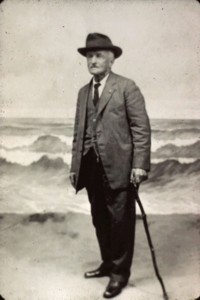I was out on the
field and saw
hundreds of killed
and wounded. . . .
I hope I may
never see such a
sight again.
|
About the Author . . .
Oney Foster Sweet

|
Oney Foster Sweet
circa 1864
|
Oney Foster Sweet enlisted in the United States Army on September 4, 1861, at age nineteen (born December 13, 1841), reenlisted after three years and served until the end of the war, being mustered out on June 10, 1865.
He hailed from Gibson Township, Susquehanna County, in northeastern Pennsylvania, and appears to have volunteered for service along with several of his boyhood friends.
He was assigned to the 1st Pennsylvania Light Artillery, Battery F, which became known as Ricketts' Battery at the Battle of Gettysburg. (Light artillery meant horse-drawn, field artillery that could be relatively easily mobilized and repositioned, as opposed to heavy artillery used for permanent or semi-permanent fortifications.) His battery joined the Army of the Potomac and spent the entire war in the general vicinity of Washington, D.C., protecting the nation's capitol.
Judging from his writing, he seems to have been a gregarious, fun-loving young man, yet also someone who felt strongly about keeping the Union together. He was an avid reader, often noting in his diary when newspapers or magazines failed to arrive with the mail.

|
Oney Foster Sweet circa 1912
|
He wrote to his mother that "I like soldiering first rate," and "I like soldier's life full as well as I expected I would." But if he had a degree of naiveté about what lay in store for him, that evaporated rather quickly, following a deadly skirmish with Rebels. He wrote that "I was out on the field and saw hundreds of killed and wounded. . . . I hope I may never see such a sight again." Nevertheless, he witnessed much worse, including the deaths of many men (and horses) in his unit.
Sweet felt fortunate to have survived the war, having fought at Bull Run, Antietam, Chancellorsville, Gettysburg and other major battles, as well as scores of skirmishes with Rebel forces. Yet, he also saw that more men died from sickness than combat. He told his mother, "I am more afraid of disease than the bullet. It is more fatal in this army." (According to historical records, 2 of every 3 deaths resulted from disease.)

To get on the mailing list or for additional information, contact:
Wigeon Publishing
info@wigeonpublishing.com
|
|
|
|
Copyright © 2010-, Wigeon Publishing
|
|

